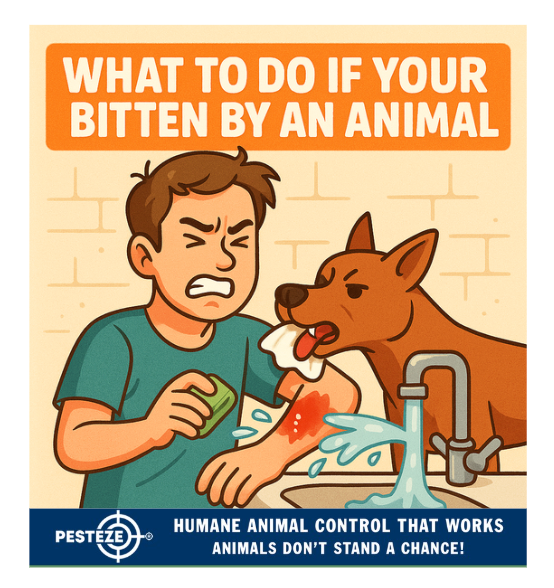WHAT TO DO IF YOU ARE BITTEN BY AN ANIMAL

WHAT TO DO IF YOU ARE BITTEN BY AN ANIMAL
SUMMARY
Animal bites can be serious, even if they seem small. This guide explains immediate steps to take after an animal bite, when to seek medical help, and how to prevent complications like infections or rabies.
FEATURES
-
Stay calm and safe: Move away from the animal to avoid further injury.
-
Clean the wound: Wash with soap and running water for at least 5 minutes.
-
Control bleeding: Apply pressure with a clean cloth if necessary.
-
Use basic first aid: Apply antiseptic and cover with a sterile bandage.
-
Seek medical care: Visit a doctor for evaluation and vaccinations.
-
Report the incident: Notify local authorities if the bite came from a stray or wild animal.
GUIDE DESCRIPTION
Animal bites can range from minor scratches to deep puncture wounds, and even small injuries carry the risk of infection. Knowing what to do if you are bitten by an animal ensures you respond quickly and effectively to protect your health.
The first priority is to stay calm and move to safety. Step away from the animal to prevent further bites. Do not attempt to chase or handle the animal again, especially if it’s a stray or wild species.
Next, clean the wound immediately. Rinse the bite thoroughly under running water for at least five minutes. Use mild soap to remove dirt, saliva, and bacteria. This step is critical to reduce the risk of infection.
If the wound is bleeding, control it by applying pressure with a clean cloth or sterile gauze. Minor bleeding may help flush out bacteria, but heavy or uncontrolled bleeding requires urgent attention.
After bleeding is controlled, use basic first aid. Apply an antiseptic solution or cream to the wound and cover it with a sterile bandage. Avoid using tight dressings that can restrict circulation. Change bandages regularly and monitor the wound for signs of infection such as redness, swelling, or pus.
It’s essential to seek medical care, even for minor bites. A healthcare provider can determine whether you need stitches, antibiotics, or vaccines. Rabies vaccination may be necessary if the animal was unvaccinated, stray, or wild. Tetanus shots may also be recommended if you haven’t had one in the last 10 years.
Finally, report the incident to local animal control or health authorities, particularly if the animal was unknown to you or behaving unusually. This helps track potentially dangerous animals and prevents risks to others.
By acting quickly—cleaning the wound, applying first aid, and seeking medical help—you greatly reduce the risk of infection and serious illness. Following these steps ensures both your safety and the responsible management of animal encounters.
- Saneeth Thota


Comments 0